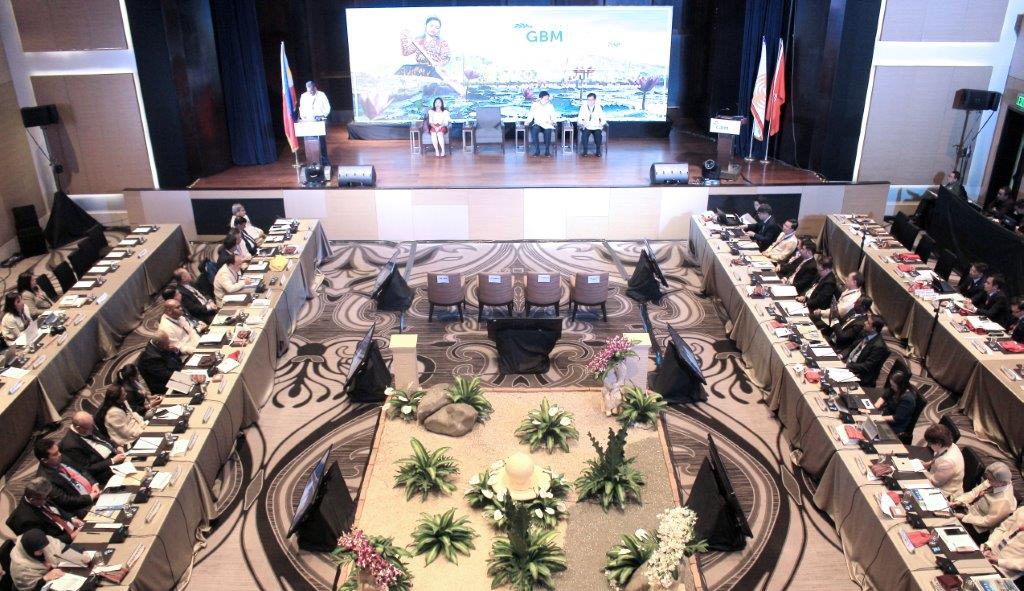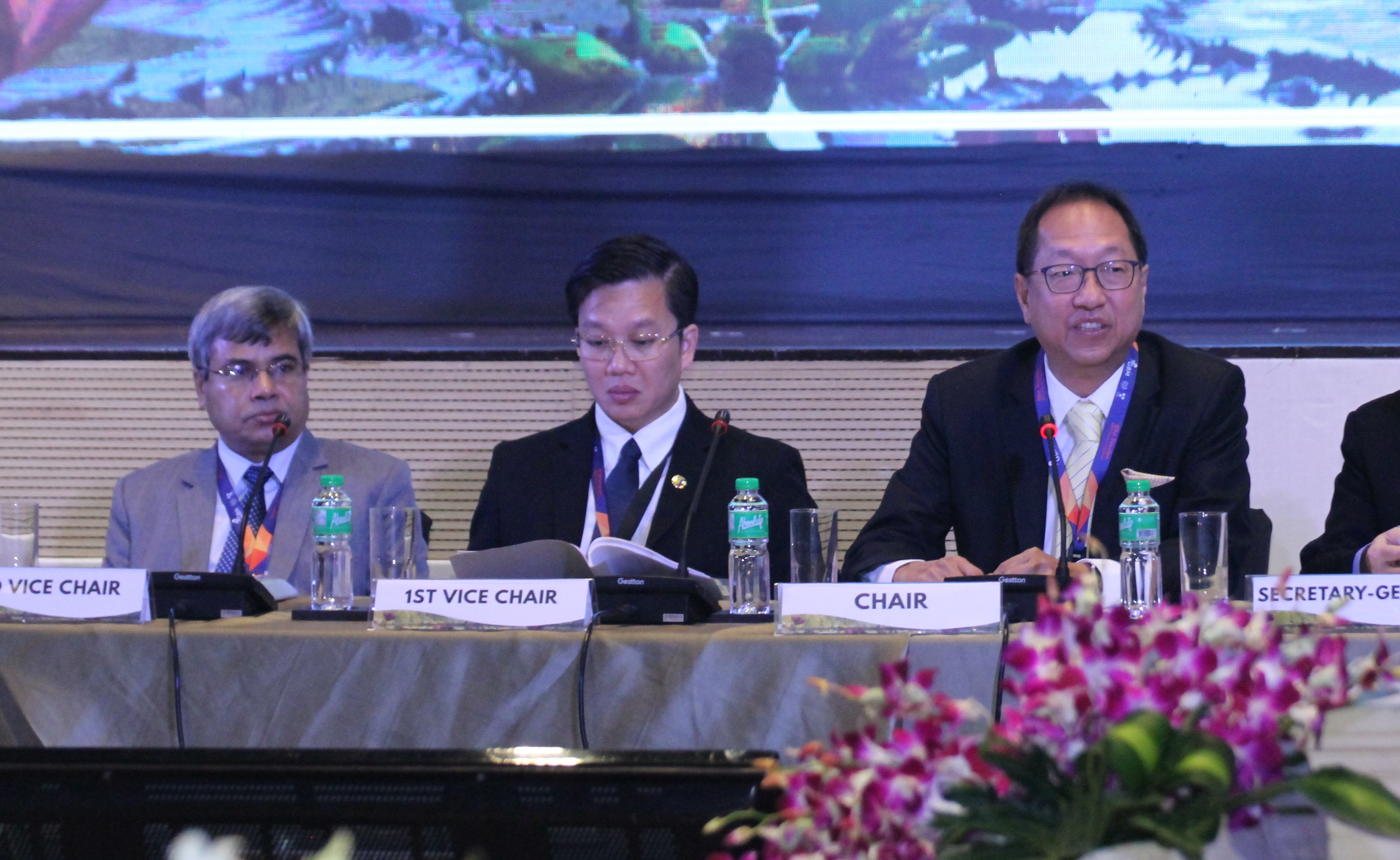
Select Page
“For the Asian Productivity Organization (APO) to continue to flourish as a dynamic organization in a future dominated by artificial intelligence, we must take a holistic and proactive approach to solve sustainability issues and ensure that the benefits of productivity gains are shared fairly with our people,” said APO Secretary-General Dr. Santhi Kanoktanaporn.

61st GBM in progress.
Presenting the Annual Report at the 61st Session of the Governing Body Meeting (GBM) in Manila, the Philippines, he stressed that high productivity growth was important for member economies to sustain socioeconomic development and allow current and future generations to prosper. Held 10–12 April 2019, the GBM, as the supreme decision-making body, was attended by 55 representatives and advisers from 19 APO member countries and an observer from the UN Industrial Development Organization.
In his inaugural address, Guest of Honor and Philippine Cabinet Secretary Karlo Alexei B. Nograles pointed out that APO member countries had much to gain and learn from the admirable advocacies and pursuits of the organization and called upon member governments to reorganize their national productivity organizations (NPOs). The Cabinet Secretary stated that industry leaders, trailblazers, and stakeholders should make concerted efforts to harness the best of the development sciences, disciplines, and models in business and industry.
Highlighting the role played by the APO, Nograles commented, “Since its inception in 1961, it is the APO that has seen with our leaders, through the same eyes of hope and inspiration, the potential of the Filipinos to learn, explore, and utilize available resources and technologies and turn them into new solutions that anticipate the needs of our industries.”

APO Chair and Vice Chairs for 2019–2020 (L–R): 2nd Vice Chair Md. Abdul Halim, 1st Vice Chair Dr. Ha Minh Hiep, and APO Chair Dr. Pasu Loharjun (Thailand).
In welcoming GBM delegates, APO Director and Undersecretary for the Regional Development Office, National Economic and Development Authority, Dr. Adoracion M. Navarro noted that as the supreme organ of the APO, the Governing Body discussed and decided on policy, finance, programs, membership, and other governance issues concerning the organization. By hosting this meeting, the Philippines believed that it was contributing to the formulation of the APO’s vision and roadmap as well as other key decisions to be made during the GBM.
Outgoing APO Chair J.J. Rathnasiri thanked the Philippines for hosting the GBM and the Development Academy of Philippines (DAP) for the arrangements. He believed that with the Asia-Pacific region fast becoming the world economy’s center, APO members could reap dividends through reliance on productivity-driven growth strategies. “Since the world’s economic center of gravity is moving toward the Asia-Pacific, there will be many opportunities for all member countries to develop their economies during the next two decades with the application of productivity concepts,” he said.
During the plenary session, Chair Rathnasiri presided over the election of the new APO Chair and Vice Chairs for 2018–19. While APO Director for Thailand Pasu Loharjun was elected APO Chair for the period, APO Alternate Director for Vietnam Dr. Ha Minh Hiep and APO Director for Bangladesh Md. Abdul Halim were elected First Vice Chair and Second Vice Chair, respectively.
Important GBM agenda items included the Annual Report of the Secretary-General, approval of the Financial Report for the Year 2018 and the APO Revised Budget for the 2019–2020 Biennium, and Report of the 59th Workshop Meeting of Heads of NPOs to the Governing Body. The agenda also included discussion of proposals for setting up new Centers of Excellence (COE), the membership contribution formula for 2021–22, and establishing a task force to develop the APO Vision and Strategy 2025.
Another important agenda item was the appointment of a new Secretary-General. The GBM elected Dr. Achmad Kurnia Prawira Mochtan, nominated by the Government of Indonesia, as Secretary-General for 2019–22. He will assume office in September. Setting up a new COE on Smart Manufacturing under the China Productivity Center was also approved.
Presenting the vote of thanks, APO Director for the ROK Kyoo-Sung Noh expressed appreciation to Cabinet Secretary Nograles for gracing the meeting and giving the eloquent inaugural address. He also thanked APO Director for the Philippines Navarro for hosting the GBM and delivering the warm welcome remarks. The Director expressed gratitude to outgoing Chair Rathnasiri, who presided over the inaugural session and the preparatory meeting during this GBM. He thanked First Vice Chair and APO Director for Vietnam Ha Minh Hiep and Second Vice Chair and APO Director for Bangladesh Md. Abdul Halim for their firm handling in support of the Chair, which allowed GBM discussions and presentations to proceed smoothly and productively. Director Noh also appreciated the leadership of Chair and APO Director for Thailand Pasu Loharjun while moderating the plenary sessions.
In the closing statement, APO Secretary-General Dr. Santhi thanked all Directors and delegates for their cooperation in making the GBM successful. He also thanked Guest of Honor Cabinet Secretary Nograles of the Office of the President of the Philippines for attending the GBM and strongly supporting the activities of the DAP and APO to improve the productivity of member economies.
He stated that it was very important to build the APO’s capacity to manage several large projects under the Specific National Program (SNP) simultaneously to meet the growing demand of member governments to develop productivity and innovation plans, a concern that cut across countries at different levels of development. Dr. Santhi said that it had been a great honor for him to serve member countries in the capacity of Secretary-General. “I hope that the APO will continue to be able to catalyze the productivity growth of member economies through its key business transformations,” he concluded.
In his closing remarks, APO Chair Pasu Loharjun expressed appreciation to the delegates for their fruitful discussions in the meeting which had successfully addressed all the agenda items. He deeply appreciated member countries’ initiatives and the directions that they were taking to achieve sustainable productivity.
Stating that the 61st GBM had been a great success, he believed that the approval of the new COE on Smart Manufacturing was a significant decision would disseminate practical knowledge to member countries, leading to dramatic improvements in manufacturing productivity. In time, each member country might have its own COE to reflect the progress made. He hoped that all member countries would develop specialized knowledge in productivity, while noting that the implementation of visions and strategies was key to achieving the objectives. He urged member countries to commit resources to developing a new APO Vision and Strategy 2025.
Annual Report by the Secretary-General
Presenting the Annual Report for 2018, Secretary-General Dr. Santhi acknowledged that even though the Secretariat had introduced several initiatives since September 2016, including new digital technology elements aimed at addressing the current and future needs, those were not enough. There was a need to adopt a more sustainable business model to enable the APO to achieve its vision and mission. He pointed out that the new business model had first been introduced at the GBM in Lao PDR and further discussed at the Strategic Planning Workshop in July 2018 and endorsed by the WSM last year.
“To recap, the six key business transformations required to pivot to the new business model are: policy advisory services; digital business ecosystems; comprehensive national productivity master plans; industry transformation centers; the APO Accreditation Body; and co-branded research,” he stated, adding that, “With your strong support, we have finally reached the final but most challenging phase in our transformational journey: strategy execution.”
The Secretary-General noted that the budget format for 2019 and 2020 had been revised to better reflect the new business model, with existing and transformational programs reclassified into the three broad categories of Smart Transformation, Capability Development, and Individual-country Programs. While Smart Transformation was spearheaded by the Industrial Transformation and Agricultural Transformation Initiatives, the Industrial Transformation Program aimed to build the capacity of member countries to speed up their adoption of Industry 4.0. The Agricultural Transformation Program was an attempt to improve productivity through policy advisory services and digital applications in the agrifood sector, he reported.
Dr. Santhi also informed the Governing Body that a new digital business platform program had been included in the budget to support the move to a platform-based model for both industry and agriculture. That platform would leverage technologies to help connect the APO with its stakeholders in industry and agriculture. Another program introduced at the 2018 APO Sustainable Productivity Summit was the Future Food Initiative, which would contribute to the sustainable food security of member countries.
“The Capability Development Program is underpinned by the three subprograms of Strategic Foresight, the Accreditation Body, and Sustainable Productivity. Strategic Foresight is a completely new program aimed at helping member governments enhance the future-readiness of strategic planning by embedding foresight capabilities into the long-term planning process. Under the Accreditation Body, the APO will assist NPOs in developing new productivity courses to increase the pool of certified experts in member countries. This will not only strengthen the capacity of member countries in productivity fields but also enhance the brand recognition of the APO and NPOs throughout the Asia-Pacific,” Dr. Santhi said.
He explained that the Sustainable Productivity Program would help deepen the APO’s current productivity measurement capability and expand its research into the development of new measures that more accurately captured the contributions of technology through collaborations with leading global institutions. Pointing out that the Individual-country Program was not a new category, Dr. Santhi stressed that the new SNP introduced in 2018 had the potential to become the single most impactful program offered by the APO.
“Initially, we faced a steep learning curve in working with member governments to develop comprehensive national productivity plans. Since this approach requires integrating efforts across key stakeholders in each country, it is critical to have strong leaders with the political will to champion national productivity drives. Through sustained efforts supported by NPOs, we gained the confidence of key officials and worked with relevant government agencies to deliver a national productivity blueprint for Cambodia in 2018. Similar blueprints for other member governments will be completed this year under the SNP,” he stated.
In closing, Dr. Santhi commented that the programs presented in the revised budget were at the heart of the transformation strategy. “When successfully implemented in the next two years, they will move the APO completely into the new business model.”
Inaugural address by Philippine Cabinet Secretary Karlo Alexei B. Nograles
Welcome remarks by APO Director for the Philippines Dr. Adoracion M. Navarro
Opening address by APO Chair J.J. Rathnasiri